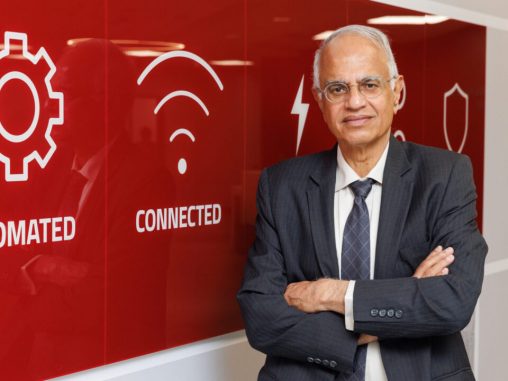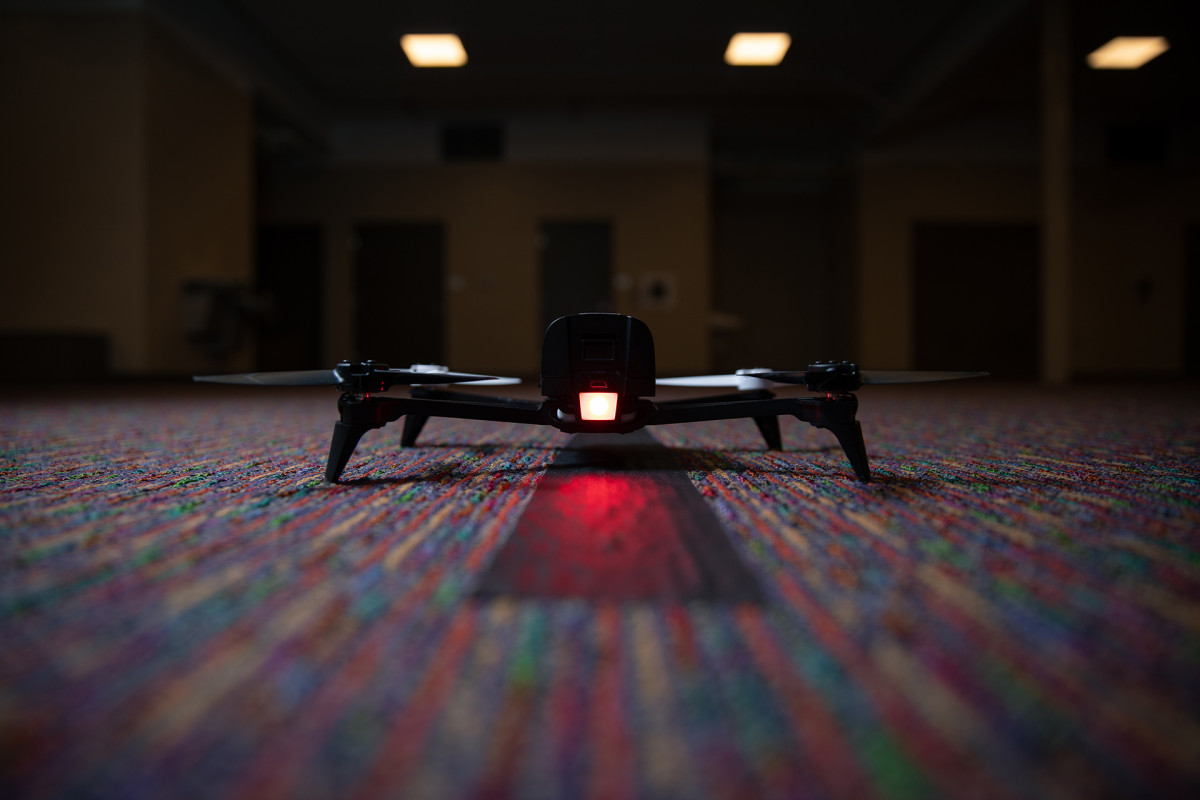Teaching and research are linked: the skills and leading edge technology utilized in research projects are transferred to students in the classrooms and laboratories.

With a grant from the Federal Transit Administration and the United States Department of Transportation, The University of Alabama is gearing up for a $3 million project to develop advanced...

Three University of Alabama students have received Boren Scholarships for the study of languages in world regions critical to U.S. interests and underrepresented in study abroad.

Human Technology Interaction Lab
Research falls at the intersection of physiological computing and Human-Computer Interaction (HCI). Current research activities aim to expand knowledge regarding ways to design, implement and evaluate novel physiological computing systems that enhance usability and user experience (UX). This work involves designing adaptive closed-loop systems that interpret users’ affective states using neurophysiological signals such as Electroencephalography (EEG). Ongoing research is also exploring ways to abstract low-level signal processing procedures to address barriers of entry to areas of physiological computing. This work also involves investigating ways to introduce novice programmers to physiological computing concepts. A usability lab equipped with an observation room and experiment area is used to evaluate human interactions with these novel systems.
Affiliated Faculty: Dr. Chris Crawford
Spatial Data Science Lab
Spatial data science is a field that lies at the intersection of data science and geospatial information science, and studies how to identify patterns or make predictions from massive spatial data. With the advancement of GPS and remote sensing technology, and the popularity of mobile devices, large amounts of geospatial data are being collected at an increasing speed. Analyzing such data assets is already transforming the society in environment management, disaster response, and transportation. The lab’s mission is to investigate effective and efficient data science techniques, particularly focusing on spatial or spatiotemporal data, in the context of societally significant applications. The team currently investigates spatial prediction models, spatial pattern analysis on networks, and spatial big data computation with interdisciplinary applications in hydrology, transportation, and public safety.
Faculty member: Dr. Zhe Jiang
Software Engineering Research Group
Key areas of interest include empirical software engineering, model-driven engineering, and human factors. Research in empirical software engineering seeks to use empirical methods to gather quantitative and qualitative data to characterize, understand, and evaluate the software engineering process. Ongoing projects focus on improving the development of open-source software and understanding how to properly apply software engineering practices to the development of research software. Research in model-driven engineering seeks to reduce the gap between the problem domain and the solution domain by modeling all aspects of the software system with concepts from the problem domain, instead of source code. Ongoing projects focus on applying software engineering techniques such as transformation, simulation, analysis, and evolution to software and systems models. Research in human factors seeks to understand and eliminate barriers faced by the people in the software engineering process. Ongoing projects focus on understanding human error in requirements and studying the effects of social debt on software development.
Affiliated Faculty Members: Dr. Jeffrey Carver, Dr. Jeff Gray
Computer Science Education
Research in Computer Science Education focuses on pedagogical techniques for computer science that are applicable to students and teachers from the K-12 grades through higher education. A core area of K-12 focus is the investigation of professional development models for training in-service and pre-service teachers as future computer science educators. Other topics of interest in the K-12 space include the design of block languages for introducing programming, tool support for children with accessibility needs, and curriculum development that addresses broadening participation in computing for underrepresented students. At the university level, research includes topics related to pedagogical techniques for software testing and training Computer Science Education researchers on proper empirical methods.
Affiliated Faculty: Dr. Jeff Gray, Dr. Jeffrey Carver, Dr. Chris Crawford, Dr. Travis Atkison
Distributed Autonomy Laboratory
Research focuses on using teams of robots to accomplish high-level tasks. Appropriate shared representations and communications paradigms are tested in simulation and in a lab environment. Collaborations exist between software engineering, behavioral science and networking. Research includes the study of appropriate multi-robot experimental frameworks through evaluation of measurement tools, software architectures and development and simulation environments. A specialized testing facility is instrumented with ground truth localization and image systems for data collection.
Affiliated Faculty Member: Dr. Monica Anderson
The University of Alabama Center for Advanced Public Safety
CAPS is committed to using state-of-the-art technologies to offer products and specialized software development services in a variety of areas. The four main focus areas are highway safety, homeland security, judicial management and law enforcement. CAPS includes the analysis and presentation of spatially-enhanced information, with emphasis on traffic safety, criminal justice and homeland security data domains. CAPS also maintains the Safe Home Alabama web site (http://www.safehomealabama.gov/) that is dedicated to provide information to advance traffic safety in Alabama and throughout the country. This web site contains dozens of special quantitative studies that have been conducted by CAPS over the past five years on various subjects to advance traffic safety.
Affiliated Faculty Members: Dr. Randy Smith, Dr. Brandon Dixon, Dr. David Brown, Dr. Jeffrey Carver, Dr. Travis Atkison
Networking, Wireless Networking and Mobile Edge Computing
Current research activities focus on Software Defined Networking (SDN), network infrastructure for big data movement, ad hoc networking, underwater acoustic communication and networking, sensor networks, sensor arrays, DSRC V2X and intelligent transportation systems, information centric networking and mobile edge/fog computing. Some applications include developing technologies for connected and/or autonomous vehicular applications, mobile edge/fog computing platforms, 5G ultra dense networks, quality, secure and reliable tele-healthcare, particularly in cardiovascular diseases, diabetes, and elder healthcare.
Websites: WiMaN and W4-NET
Affiliated Faculty Members: Dr. Yang Xiao, Dr. Xiaoyan Hong
Computer and Network Security and Privacy
Cyber security research involves the defense of computer systems, from mobile systems to control systems, from damage or compromise of their data and/or components. Current research activities focus on password protection, lightweight cipher, intrusion detection, denial of service mitigation, secure protocols, accountability, fraud detection, digital forensics, vulnerabilities and attacks, anonymous communications and privacy, secure and trustworthy vehicle communication, security in smart grids, malicious application detection, transportation infrastructure security, threat avoidance, etc.
Websites: W4-NET, WiMaN, and DCSL
Affiliated Faculty Members: Dr. Yang Xiao, Dr. Xiaoyan Hong, Dr. Travis Atkison
Cyber Physical Systems
Current research activities focus on integration of computing, communication, sensing, and physical systems into more secure, efficient systems, such as smart homes, smart grids, smart health, smart cities, intelligent transportation, etc.
Websites: W4-NET and DCSL
Affiliated Faculty Members: Dr. Yang Xiao, Dr. Travis Atkison
Collaborative Software
Focuses on the use of collaborative software with a variety of computing devices ranging from smartphones to wall-sized display systems by one or multiple co-located users in a variety of environments. Research topics include software architecture, multiple cursor support, advanced display/interactions techniques and secure information access.
Affiliated Faculty Members: Dr. Alex Zhang
Digital Forensics and Control System Security Lab
The Digital Forensics and Control System Security Lab (DCSL) was established to create new and innovative solutions to some of the nation’s most critical areas of need, including cyber security, digital forensics, and critical infrastructure security. DCSL originated at Louisiana Tech University in 2009 and became part of the UA community in 2015. DCSL is involved with a number of projects and outreach activities centered on securing and developing a greater understanding of cyberspace. DCSL researchers are dedicated to conducting and publishing cutting edge research in peer-reviewed conferences and journals along with participating in multiple outreach programs. Outreach programs include mentoring area high school students in the areas of transportation infrastructure, digital forensics and general cyber security. The main threads DCSL researchers are currently focused on are malicious software detection, transportation infrastructure, industrial control system security, object detection, digital forensics, and threat avoidance.
Websites: DCSL
Affiliated Faculty Members: Dr. Travis Atkison
Wireless, Mobile and Networking Research Lab (WiMaN)
Affiliated Faculty Members: Dr. Xiaoyan Hong

| Speaker | Date |
|---|---|
| Dr. Edward Dillon, Morgan State | August 31, (Thursday) 2:00 p.m. |
| Dr. Sarah Lee, Southern Mississippi | Sept. 26 (Tuesday) 2:00 p.m. |
| Dr. Tim Menzies, NCSU | Oct 19 (Thursday) 3:00 p.m. |
| Dr. Marvin Adujar, USF | Oct. 25 (Wednesday) 1:00 p.m. |
| Dr. David Mohaisen, UCF | Nov. 9 (Thursday) 2:00 p.m. |
| Dr. Imani Munyaka, UCSD | Nov. 14 (Tuesday) 2:00 p.m. |
| Dr. Yiran Chen, Duke University | Nov. 28 (Tuesday) 2:00 p.m. |